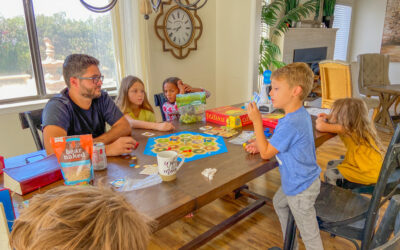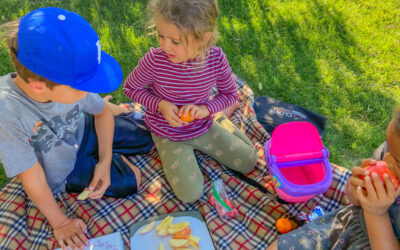I didn’t mean to get my hand stuck in the coffee pot.
It was technically more a carafe than a pot, and I’d just thrown out my scrubber stick. I was trying to clean it with a regular sponge. That tiny opening at the top of the carafe refused to release my hand. I was now even further away from my much-needed morning caffeine jolt. My six kids moved quickly about the kitchen, spreading peanut butter on toast, pouring Cheerios.
I stood by, uncaffeinated. One-handed. Impotent. Like a female Captain Hook in flannel pajama pants.
I finally yanked my wrist free. But I still needed someone to scrub the bottom of my carafe. I was not about to go in there again.
“Mom, let me try. My hand is smaller,” my thirteen-year-old daughter offered. She tried. But her hand still wasn’t small enough.
“We need a tiny hand,” I said, scanning the kitchen for my youngest.
“Hey bud,” I called to my six-year old. “I need some help and I’m pretty sure you’re the only one who can do this. Would you be able to scrub the inside of my coffee pot?”
He knew how much I love my coffee. And as he looked at me and my tired face, he knew that lending a hand would change mom’s morning trajectory.
His eyes grew wide as he set down his homework folder. “Yes! I can do that!” The kid looked as proud as ever. He scrubbed that pot with a giant smile. “I can do this every day! Whenever you need it, mom!”
It wasn’t a compliment that made him stand a foot taller. It wasn’t a treat, a later bedtime, or a new TV show. My little dude felt like a million bucks when he served his mama. He was genuinely needed, rose to the occasion, and felt useful when he blessed the family in a way only he could—tiny hands.
Helping our kids find purpose, with or without tiny hands
A psychologist who specializes in teenagers was sharing on his podcast recently. He said that the secret to making sure kids don’t grow up entitled isn’t to tell them how good they have it. It isn’t lecturing them about how blessed they are.
He said the key is to help kids develop a mindset where they’re looking for ways to serve and bless others. Ironically, it isn’t focusing on self that makes you feel great. When we focus on how to love and serve our neighbor, we enjoy tremendous satisfaction. It’s almost like we were wired to love our neighbor. Go figure.
The good news is that implementing this in your house with your own kids doesn’t cost a cent.
If you want to help your kids adopt this mindset of looking for ways to serve and bless others, here are are few ideas:
Identify a few of your child’s strengths.
Leading and delegating? Mini Marie Kondo who can infuse order to any space? Rising baseball star? Can she do cartwheels that make actual wheels on carts look graceless? Free throw savant?
Match a strength with a need in your home.
Tell your tween, “I’ve noticed how great you are at leading. You see a problem and know how to solve it. How would you feel about helping your little brothers delegate the cleanup duty in their room? They always fight about it, but maybe if you could mediate and break it down for them, you could bring a new perspective? No cleaning required. But could you help them divvy the work?”
Hand over simple tasks to willing volunteers.
One of my kids is abnormally strong. She also needs to move a lot. When I take her to the grocery store, I ask if she wants to be in charge of pushing the shopping cart. The task grounds her attention on a physically laborious task. (I do often check in to see if she wants to tap out.) I can see her countenance change as she takes on a difficult task—navigating a cart full enough to feed a family of eight. When she finished that job, she asked to help load groceries. She noticed my gratitude. She wanted to help with more. Serving begets serving.
Make sure it’s voluntary.
The most important part of this concept is that it’s not part of our kids regular required chores. You’re asking them if they want to willingly participate in serving outside of their obligations. The element of choice is critical.
Have you experienced this with your kids? I’d love to hear about it! Comment below.
You might also enjoy: Eight Practical Tips for Motivating Kids to Help with Chores
Photo credit: Donnie Ray Jones, Flickr.





0 Comments